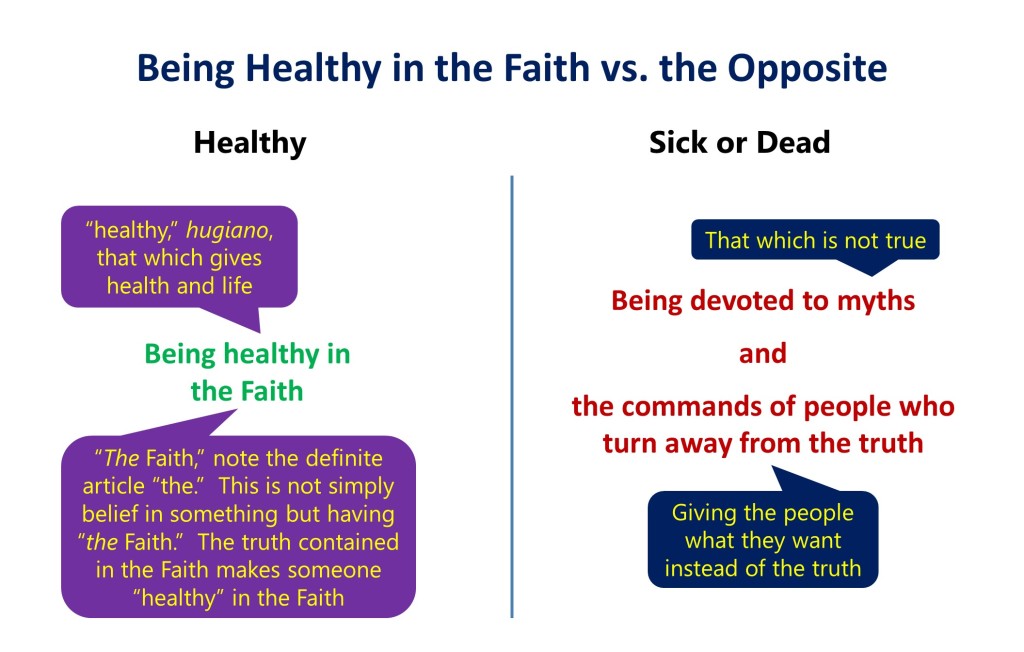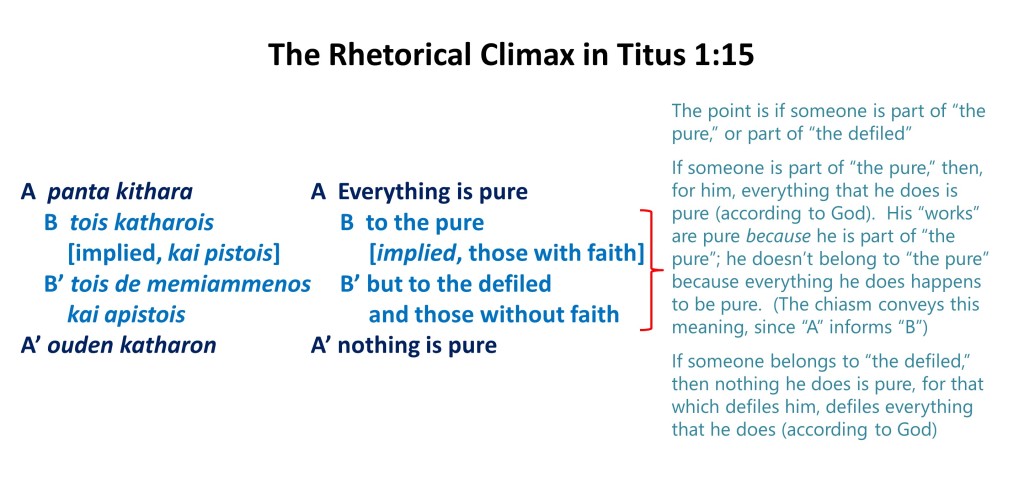 Paul told Titus “to… appoint elders in every town [in Crete]” (Titus 1:6). Paul then described whom Titus should appoint: Men with specific character traits who were “holding firmly according to the Teaching [that Jesus gave to his Apostles], a word that is faithful, so he [the overseer] can comfort someone in the life-giving Teaching and speak against [false teachings] to expose them to the light” (Titus 1:9).
Paul told Titus “to… appoint elders in every town [in Crete]” (Titus 1:6). Paul then described whom Titus should appoint: Men with specific character traits who were “holding firmly according to the Teaching [that Jesus gave to his Apostles], a word that is faithful, so he [the overseer] can comfort someone in the life-giving Teaching and speak against [false teachings] to expose them to the light” (Titus 1:9).
Paul now goes on to say why speaking against false teachings is so important.
Rebuking the Rebels
Read Titus 1:10
This section starts out mentioning the rebellious. Here, Paul isn’t listing three groups of people but one group: many rebellious [teachers]. (You can even catch that in ESV’s use of commas.) Paul used an adjective without the noun. This was not unusual in Greek, but it could also be Paul not giving them the dignity to recognize that they are teachers—they are simply rebellious.
Paul then lists how they are being rebellious: They are “empty-worded,” again leaving out the noun that follows, and deceivers.
- If these rebellious [teachers] are “empty-worded,” what does this imply they should be doing instead of teaching?
- Who is especially noted as part of this group?
Read Titus 1:11
- Why is the group to be silenced?
- Who is to silence them?
- Why?
- By whose authority were these rebellious teachers teaching? (see also Titus 1:14)
Read Titus 1:12
Excursus on the Cretans
Trying to convey the poetic feel of the saying that Paul quoted, the International Standard Version translates this verse as such:
Liars ever, men of Crete,
savage brutes who live to eat.
This saying came from Epimenedes, a 6th Century BC Cretan poet.
Paul’s quotation gives us glimpse at just how educated he was. Although a Jew, he was fully steeped in Gentile, Greek culture. Paul had earlier quoted Epimenides when he preached to Athenians at the Apeopagus: “In him, we live and move and have our being” (Acts 17:28, quotation from Cretica). In that same sermon, Paul also quoted from Aratus’ Phaenomena (Appearances): “For we are also his offspring” (Acts 17:28). And in 1 Corinthians 15:33, Paul quoted from a play by Menander, Thais: “Evil company corrupts good morals.”
Back then, Cretan culture admired someone’s ability to earn money through any means. For this reason, the Cretans saw no problem with teachers doing something for “shameful gain.” “Shameful gain” may have been a deterrent in another culture, but not for the Cretans. The Cretans would have admired such teachers. This made Paul all the more urgent in dealing with these false teachers.
Being an island known for its pirates, Cretans had a reputation for greed and dishonesty. Cicero, a Roman politician (106 BC – 43 BC), wrote, “Cretans… consider piracy and highway robbery as honorable” (Republic 3.9.15). Polybius, a Greek historian (200 BC – 118 BC), wrote, “So common among them is a sordid love of gain and lust for wealth, that the Cretans are the only people in the world in whose eyes no gain is disgraceful” (Histories 6.46.3). And Plutarch, a Greek historian (46 – 120AD), recorded that all the soldiers under Perseus’ command abandoned him—except for the Cretans. They followed him “not through good will, but because they were as devoted to his riches as bees to their honeycombs” (Aemilius Paulus 23.4)
———–
Read Titus 1:13-14
- Why else does Titus, and the pastors he is to appoint, need to “rebuke [the rebellious teachers] sharply”?
“sharply”: Greek, apotomos. This was a medical term that meant “cutting off” or “amputating.” The imagery behind this word is a surgeon who can restore the patient to health only by cutting off the diseased part. This would mean that the “rebellious” teachers would have to repent and, if that did not happen, the appointed pastor, or Titus, was to excommunicate them, “amputating” them from the congregation.
Read Titus 1:15
Excursus: Paul’s Use of Rhetoric in Verse 15
Paul brings to bear three rhetorical devices, helping emphasize the difference between those who have “the Faith” and those who don’t. To emphasize what he says, Paul uses:
Assonance: The repetition of a vowel sound, in this case, an “ah” sound. This helps reinforces the meaning of the words.
Antithetical parallelism: Where two statements are set in parallel, but the second contradicts the first. Here, the contrast is between “everything” and “nothing.”
Chiasm: Where two or more items are listed and then listed in the reverse order. The central (main) point of a chiasm is in its center.
- Who are “the pure” and why are they pure?
- Why is nothing pure to “the defiled and those without faith”?
Read Titus 1:16
- How were these “rebellious” teachers denying God by “their works”?
“detestable, disobedient”: Greek, bdeluktos kai apethas, “detestable and disobedient.” This is the only place in the New Testament that has the word bdeluktos. But in the Septuagint, we not only find bdeluktos (detestable), we even find it paired with apethas (disobedient), just like what Paul did in this verse!
Paul expected Titus to have the Septuagint’s pairing of “detestable and disobedient” shape how he understood them. The Septuagint pairs these words together when it contrasts the human will against God’s will (See Proverbs 29:27; Sirach 1:25, 13:20). Yes, these rebellious misleaders were “detestable and disobedient,” but the Septuagint’s pairing of these words reinforces that their will was at odds with God’s will.
“unfit”: Greek, adokimos, unqualified or disqualified. The rebellious teachers were unqualified for “any good work” because they didn’t have that which made their works “good.” A “good work” in God’s eyes is not dependent on the quality of the work as we would perceive it (is it a “good work” according to human standards?). It depends on Jesus making someone’s works “good,” which subjectively takes place when one has “the Faith.”
Excursus: Serious Words for a Serious Situation
In this section, Paul uses five words that are found nowhere else in the New Testament.
- mataiologos, “empty-worded.” The ESV translates this as “empty talkers” (Titus 1:10).
- phrenapates, “misleader.” The ESV translates this as “deceivers” (Titus 1:10). Such a person looks like he is leading people in the right direction when he’s not. He’s misleading them.
- epistomizo, to stop the mouth. The ESV translates this as “must be silenced” (Titus 1:11).
- ioudaikos, Jewish, which the ESV also translates this way, referring to myths (Titus 1:14).
- bdeluktos, detestable, which the ESV also translates this way (Titus 1:16).
The undercurrent in this section is that the false teachers seem to have purity by following the Old-Covenant Law as a way of helping someone have salvation. Yet, the “word” they bring is empty, devoid of life. They are “misleaders,” leading people to death, not life. That is why their mouths need to be stopped.
These rebellious misleaders were not just passing myth as truth, but “Jewish myths.” This was more than trying to get people to follow the Old-Covenant Laws, which was bad enough in itself. They were passing on “myths” that had the aura of truth, since these “of the circumcision party” knew the Scriptures in a way that the Gentile converts did not. Instead of their knowledge helping the Gentile converts on Crete, it was misleading them. That was why they were “detestable.”
———–
Pastors Speaking the Healthy Doctrine
Read Titus 2:1
Pastor’s translation: “But you, speak [imperative verb] that which is proper, according to the health-giving Doctrine.”
- Based on the context of this verse, what was Titus to be doing in his speaking?
“that which is proper”: Greek, hos prepo. What Titus is to teach by speaking, properly applying “the Doctrine” to the Cretans. The Christians in Crete didn’t “get” what living out the Faith looked like. Earlier, Paul alluded to this when he quoted Epimenedes: “Liars ever, men of Crete, savage brutes who live to eat.” The Cretans needed to have their worldview shaped by “the Doctrine,” not the cultural norms of their day.
“the health-giving Doctrine”: The definite article (the) shows the Church’s teaching is an inviolable whole, not many teachings, or a teaching, but “the Teaching.” The Teaching (or the Doctrine) contains that which gives health and life.
Paul will then direct Titus to speak “that which is proper, according to the health-giving Doctrine” to various subgroups in the congregation. But that’s next week’s lesson.
Click here to go to the next Lesson.



